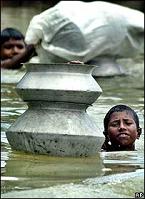The world’s leading climate experts have issued their bleakest forecasts of the impacts of global warming, predicting glacier melt in the Himalayas and reduced crop yields and cholera outbreaks in South Asia.According to the UN Panel on Climate Change, Asia’s heavily-populated mega delta regions will be at “greatest risk of flooding from the sea as well as from the rivers.
The report predicts the earth is likely to warm by 3 degrees centigrade during this century.
Our correspondent Vinod K. Jose reports from New Delhi on what that means for India.
6 O’clock in the evening; ear breaking sound.
Thousands of households put their water pumps on.
Piped-in water service to a residential area like this in Delhi only lasts for half an hour a day.
Kamna Singh rushes back home from the office to pump up her water.
This is urban India.
“For the last four days I received no water supply. Can you believe this, for four days a family of 5 has been living with a very meager amount of water in this scorching summer? When we complain the authorities say there is a genuine water shortage, life is becoming really hard in the cities.
Miles away, in rural Central India buffaloes plow the land.
Farmer Ganesh Hariram is upset that the rainfall is steeply reduced year after year.
He cannot plow the land well when the soil is not wet enough.
“This used to be a paddy field surrounded by forests. Now outsiders will laugh if we say this was a forest. They have deforested this area like nobody’s business. Trunk loads of trees were cut from here. They also set up an iron mining industry here. Now they operate for 24 Hours, pollute our rivers, air. The result is that we have no rain! You see farmers like me are losing our livelihood. It becomes so hard to plow the land. We still use animals to plow it. We cannot afford machines. That is why rain is more important.
Climate change has affected millions of people’s lives IN many ways.
And, the poor suffer the most. Srinivas Krishnaswamy is Greenpeace India’s climate and energy campaigner
“As the summer increase with increase in temperatures, you have long summers and shorter rainy seasons. It’s the rainy season which largely feed into the river system. Even if it is natural springs or groundwater recharge it is largely due to rains. Now with this kind of phenomenal increase in the temperature in the last decade the water table has reduced. Yes, it is also true that there is also over drawing of water from the groundwater. But that is not the only reason. Recharge of water is also reduced, because of the increase in temperature. And the rising temperatures also affect the rainfall pattern, so that affects agriculture for instance.
The UN climate report has very bad news for India.
They predicted Food shortages, water scarcity, heat waves, floods and the migration of millions of people, all, because of climate change induced by greenhouse gas emissions.
Rising sea level in low-lying areas of India and Bangladesh has already forced thousands of people from their land.
They join the growing wave of environmental refugees.
“Lot of coastal cities could be inundated. Cities like mumbai, chennai face the threat.
The UN study estimates that a mere 45 cm rise in the sea level will destroy 75 percent of forests spread over a 10,000 square km area in West Bengal and Bangladesh.
Mala is a fisherwoman at the coastal town of Karvar at the Western coast of India. Rise in sea level has affected her life drastically.
“Where would I go with my babies when my hut is washed away by rough sea? I have no option but to live at the sea shore, because I depend on sea for livelihood. Twice I had to remake my hut in the last two years as the sea water level increased. Sea erosion increases along with the height of waves.
Dr. Rohan DSouza is with Science Policy research in Delhi
“The maximum that can actually happen is that in the short front most of the vulnerable and the poor will pay the highest price. While the rich will be able to relatively meet their requirements by actually trying to buy themselves out of their crisis. The basic problem is that capitalism has reached its ecological limits. It can’t push ahead anymore.
Author Arundhati Roy lives in Delhi.
Rural India to urban India, people are feeling the impact of environmental degradation she says.
“What is going to happen when the rivers dry up? What are all these tidal waves about? What is the earth telling us? It sounds like it is fine as long as some weird hippies singing. But now it is not that. It is a serious situation. Even in delhi the water tables is dropping. There is not a single river with potable water in india. We know all these. But we are only just accelerating that process.
Experts predict that even if we stop emitting heat trapping gases, the climate would not stabilise for many decades because the harm has already been done.
To lessen the damage there must be a dramatic reduction in emissions of these gases.
The government, individuals and corporate biggies can all help. But, is anyone listening to the earth, is the big question.















